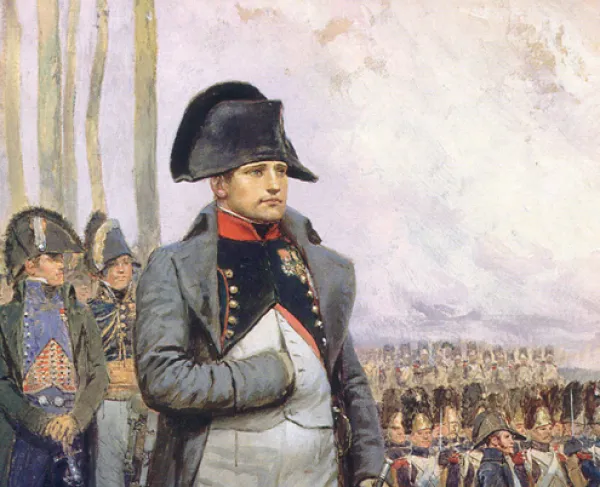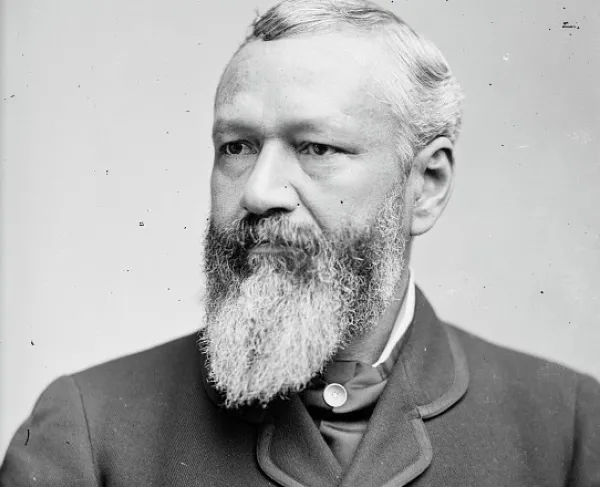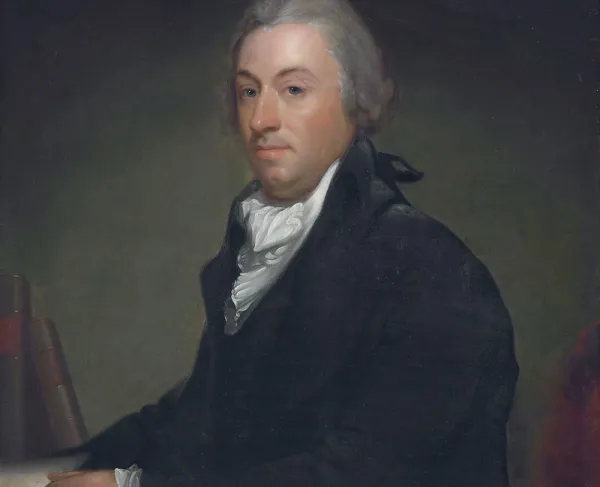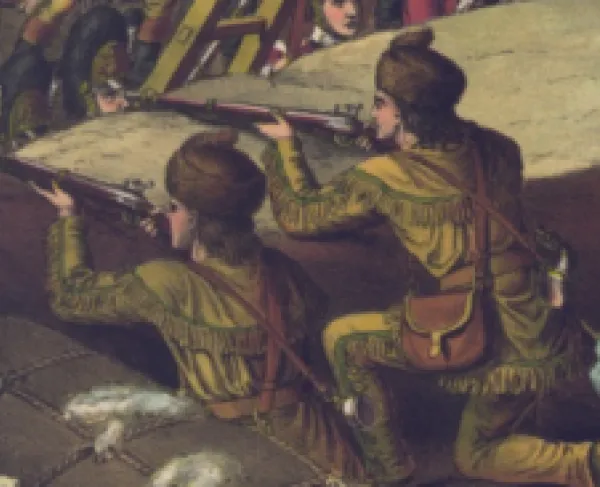Napoleon Bonaparte

One of history’s greatest and most ambitious military leaders, Napoleon Bonaparte came to power in France amid the chaos of the French Revolution. Crafting his empire through military expansion, Napoleon was one of the most powerful men alive in the early nineteenth century. Although Napoleon never set foot on American soil, his legacy as a military leader can be seen through much of American military history. His foreign policy and conflicts with Great Britain were vastly important to American political and military action, especially before and during the War of 1812.
Born on August 15, 1769 on Corsica, an island off the coast of Italy, Napoleon grew up the son of a struggling lawyer with a large family. He moved to continental France to pursue his education in military academies. When Napoleon graduated from the military academy in Paris, he ranked 42nd out of his class of 58 students. He earned a post as a second lieutenant of artillery in a training school and began his career as a military officer.
As Napoleon began his military career, France was on the verge of revolution. Economic strife and inequality created a desire for constitutional reform and a reduction of the monarchy’s authority. A reader of Enlightenment thinkers such as Rousseau and Voltaire, Napoleon supported the anti-Monarchist revolution in France and its associated social reforms. On July 14, 1789 revolutionary fervor reached its tipping point with the Storming of the Bastille. Parisians stormed the Bastille prison fortress, and King Louis XVI lost his control of the city. The National Convention ordered the execution of the king and many others in the nobility class during the Reign of Terror, in which a radical faction of revolutionaries executed many members of the aristocracy by guillotine. In 1795, the French Directory, a committee made up of 5 Directors, was established to create a new government for France.
Napoleon quickly rose through the ranks of his military peers when he fired on royalist insurgents who threatened the French Directory, which was meeting in October 1795. Because of his defense of the new government, the Directory awarded Napoleon command in a military campaign against the Austrians, who France was at war with. His success during this campaign led him to even greater national prominence.
At this time France was still engaged in a naval war with Great Britain, its most powerful enemy. Instead of relying on inferior French naval power to fight the British, Napoleon devised a plan to weaken the British empire by threatening their trade interests in Egypt. This campaign began with early successes for Napoleon, including the capture of Malta and Alexandria.
During the Battle of the Nile in August 1798, British Admiral Horatio Nelson destroyed French ships, leaving Napoleon’s forces stranded on land. Unable to march through Syria, Napoleon retreated into Egypt. His invincibility was questioned for the first time by world powers. Despite these difficulties, it gained him prominence in France as he effectively governed from Cairo.
In 1799 a coup d’état within the French Directory ousted moderate politicians in favor of more radical republicans who feared the re-imposition of the monarchy. This more radical government believed France needed a temporary military dictatorship to quell monarchist sentiment. Napoleon, in collusion with one of the five Directors, carried out his own coup which forced the directors to resign and created a new government, the Consulate, of which Napoleon made himself First Consul.
In early 1803, war with Great Britain was on the horizon. France's colonial endeavors also changed during this time. After failing to suppress a revolt led by Toussaint Louverture in the colony of Saint-Domingue (present-day Haiti), Louisiana became an unfavorable strategic position for the French. As war with Britain loomed, Napoleon agreed to the Louisiana Purchase with President Thomas Jefferson. In exchange for $15 million, the United States received 828,000 square miles of land between the Mississippi River and Rocky Mountains. The purchase marked one of the greatest achievements of Thomas Jefferson's presidency, and gave Napoleon a much-needed influx of cash. The Louisiana Purchase also signified the end of Napoleon's ambitions for a French North American Empire.
When Great Britain declared war on France in May 1803, conflict on the continent spilled over into the Atlantic. The Napoleonic Wars refer to military conflicts from 1803 to 1815, in which Great Britain and allies fought for European supremacy against France. The United States attempted to stay neutral during these conflicts, but the importance of trade with these nations made neutrality difficult to maintain. The British navy began to impress American sailors into the British Navy to support their efforts against the French. Impressment refers to the practice of seizing U.S. citizens and forcing them into the British Navy. This practice, in addition to trade embargos, increased tensions with Great Britain in the United States.
In 1804,Napoleon consolidated his power by crowning himself Emperor of the French. As Emperor, Napoleon had to guide France out of the chaos caused by the French Revolution. His authoritarian reign used censorship and propaganda to maintain control. A product of Enlightenment thinking, Napoleon ruled as an enlightened despot. He did not believe in universal suffrage or parliamentary debate, but he instituted some administrative reforms under his authoritarian rule. The 1804 Napoleonic Code was an extensive set of laws that established equality before the law and influenced the civil codes in many European countries.
On December 2, 1805 Napoleon defeated the armies of the Austrian Empire and Russian Empire in the Battle of Austerlitz. Considered one of his most brilliant battles, this victory against the allied powers of the Russian Empire and Austrian Empire secured French dominance on the continent. Throughout the battle, the allies lost 15,000 men and Napoleon lost 9,000. The Napoleonic Wars continued into the next decade.
As conflict with Britain continued, Napoleon sought to disrupt the source of Britain’s power: its trade ties. Napoleon imposed embargoes and blockades across the continent. To this end, Napoleon invaded Spain and declared his brother, Joseph Bonaparte, as King of Spain in 1808.
In order to force the Russians to comply with the embargo against Britain, Napoleon decided to invade Russian territory. During the Russian Campaign of 1812 Napoleon assembled the largest army ever seen on the continent, with around 450,000 troops. The invasion of Russia is regarded as one of the most disastrous military endeavors ever attempted. Napoleon pushed his troops rapidly into Russian territory, and they soon began to suffer from disease, extreme weather, and a lack of resources. While winning victories in minor battles, Napoleon failed to force the Russians to surrender, and his army further deteriorated. After starting a retreat, Napoleon left for Paris on December 5th and the French army left Russian territory on December 12th, 1812. The invasion of Russia marked one of the most catastrophic failures of Napoleon's military career. It is estimated that Napoleon lost approximately 500,000 men during the campaign.
After this disastrous campaign, a Prussian and Russian coalition formed to oppose Napoleon, and defeated him in 1813 at the Battle of Leipzig. The coalition captured Paris and forced Napoleon to abdicate his throne in April 6, 1814. After abdicating, Napoleon was sent to exile on the island of Elba off the coast of Italy. The Bourbon monarchy was restored for a brief period before Napoleon escaped exile in March 1815 and returned to resume power in France. This period between Napoleon's return from exile and his second exile is referred to as the Hundred Days. Once Napoleon regained power, another coalition formed to oppose him, made up of Britain, Russia, Prussia, Austria, and many other European powers.
The coalition mobilized and met Napoleon at Waterloo in present-day Belgium in June 1815. British forces, led by the Duke of Wellington, were supported by Prussian forces, creating a combined force of around 118,000 troops. Together they defeated Napoleon's army of nearly 73,000 troops on June 18, 1815, with heavy casualties on both sides. Waterloo was Napoleon's final military engagement, and the defeat forced his second and final abdication as Emperor of the French. Napoleon was exiled once more, this time to the remote island of Saint Helena, where he remained until his death in 1821.
Napoleon's legacy as a military tactician is marked by themes of ambition and innovation. He implemented the corps system in his Grande Armée to great effect, making his forces faster and more versatile than ever before. Napoleon also had impressive instincts for topography and timing during battle. His victories, such as the Battle of Austerlitz, are examples of genius leadership. While Napoleon guided France through the aftermath of the French Revolution and threats from rival empires, his ambitions as Emperor of France led to years of warfare and destruction.
In the wake of Napoleon's final exile, the monarchy was reestablished to govern France, with King Louis XVIII returned from his own exile to assume the throne. Napoleon's unprecedented rise to power—from the son of minor Italian nobility, to artillery officer, to revered military commander, and eventually Emperor—was thanks to his ambition, skill, and sometimes luck.





